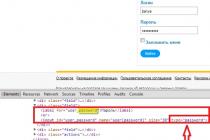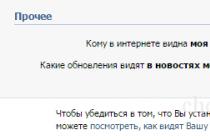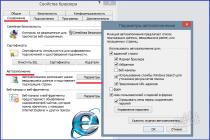Every Internet user to search the information you need uses search engines. How to search for information in Yandex? At first glance, everything looks pretty simple and easy. We go to the Internet, open home page search engine, we register the question of interest to us and proceed to the study and sorting of the answers received as a result of the search.
But not everyone knows that they have some secrets that make it easier, more accessible and enjoyable to find information.
Let's consider the main features and capabilities of this system.
What is the correct way to search for information in Yandex with a query in a few words?
What is the correct way to search in Yandex? The very first thing that needs to be done is to most accurately formulate the request itself. It must include two or more words. When you enter it into the search bar, the system traditionally gives out similar queries, synonymous words. For example, you need to find the answer to the question: "Where can you have a good rest?" In the search bar, when you enter a query, synonyms, sentences leading to the sites of the services offered (at sea, in Egypt, in India) begin to be added. Some people like this, because the search is greatly simplified, and some are distracting. If you belong to the category of the latter, then try to accurately formulate the question, the answer to which you want to find in Yandex. Alternatively, put it in regular quotes and write it in the input line.

If you have forgotten a word, then you can put any sign instead. For example: we enter in a string in quotes, and instead of an unknown word we put "*".
For example, in "Yandex" search for: "Diagnostic * in gynecology". The use of such a formulation is convenient when searching for and selecting quotations, lines from famous books, poems, when some words are simply forgotten.
It is convenient to search for information in Yandex because it gives answers to the found synonyms. You can also list synonyms in the search line, taking them in brackets and separating them with an I. For example: "successful conduct (business I case I entrepreneurship)".
How to search correctly in Yandex, using all the possibilities of the sign system
But what if you need to find sites on which the specified request should be used in full and without changes? How to search exactly in Yandex? To do this, enter the full sentence in the search bar using the & sign.

Let's look at an example: "In order & to use & the five & secrets of & effective & communication & you need & the following."
It happens that when you enter a large query, the search engine gives out unnecessary links, which significantly complicate the search. If you need to contain a specific word when issuing sentences, then search using the "+" sign: "Study of English language+ courses ".
In Yandex, look for answers to questions that contain general information(for example, about the product being sold, the services offered), without wasting time looking at the pages about their sale.
Have you decided to buy a specific car, but just want to get acquainted with its characteristics? Then in the search bar enter "CITROËN C4 PICASSO - buy".
Possibilities
In Yandex, search for information using the following options:
1. If you need to go to a specific site, then indicate it in the request. Example: "Clothes site: http: site name".
2. You can find a specific document by specifying its type in the search bar.
3. If you need to find information in a specific language, then issue this command. Example: Michael Jackson lang: en (you can specify any required language - ru, uk, be).

Search system"Yandex" provides an opportunity to search not only for information by entering verbal queries: you can also find the video you are interested in, pictures, make mailbox and get access to letters around the clock.
Search for pictures and images
Let's consider the possibility of image search. How to search for pictures in Yandex?
The system finds an exact or similar image and provides the result. The picture can be saved on the user's computer or on the Internet.
Please note: the picture must be jpeg format, gif, png and should not exceed 8 MB.
We carry out the following steps:
2. Load the picture. If the image has its own address on the Internet, then enter it in the search bar or load the image from your computer, which was previously saved. You can use in a simple way: Use the left mouse button to drag the picture to the specified location.
Searching for similar images allows the user to familiarize themselves with other images. For example, you like an item and want to purchase it in the future. By uploading the picture to the Yandex system, you can view similar things, the offered assortment, and also choose a site with the terms of sale that suit you.
The most popular queries in Yandex

Internet users may have a question: "What are they often looking for in Yandex?" It may seem strange, but people are interested in the number of the most frequently entered queries, keywords, request sizes. In order to find the answer to one question, a person spends about 2-3 minutes. A huge number of queries consists of several words (3-5), and one-word queries are getting smaller. These include, for example, titles social networks, mail, sites for adults. The number of qualifying words is also great: buy, sell, find, download, price, free, cost, delivery.
In short, the system is so versatile that it can satisfy a wide variety of information retrieval needs for users.
Conclusion
These are the main recommendations that simplify the search for information in the Yandex system, open up opportunities for using sites that contain the necessary information and answer the question of how to search in Yandex correctly. By putting our advice into practice, you will find that it will be much easier to find the information you need. And the result will please you: you will get rid of "water" by 100%, having received exactly what you wanted. Now you know how to search for information in Yandex. Go for it!
People rarely use search engine query language and in vain - with the help of a couple of simple operators, you can significantly narrow the search and find what you want much faster. And it's a shame for SEO workers not to know about search engine operators. The syntax of the Yandex and Google search engines is very simple.
Search operators help to get useful information about site indexing, identify problems and even understand the nuances of the work of search algorithms. In this article, all search operators are without examples, but they are ALL here and will be supplemented (or deleted) so that the information is relevant.
I will consider only Google and Yandex, because basically everyone works with them, the rest of the search engines are pulled up somehow themselves.
Operators common for Yandex and Google.
It should be added that if Yandex exactly follows the operators, then Google may ignore them if he thinks there are better results.
- Operator "+" and "-"- Search for documents that necessarily contain (or necessarily do not contain) the specified word. You can use several operators in one query, both "minus" and "plus"
- Quote search, quote operator ""- The search engine will search for an exact match of the phrase. Can be used multiple times in one request. You can even add a "minus" in front of one of the requests.
- Operator “*” asterisk -Yandex: Used to indicate a missing word in a quote. One star - one word. Applicable only with the quotation mark operator. Google: Used to indicate missing words in a request. The help indicates that words are A, but in practice - any number of words.
- Operator "|"- Search for pages containing any of the words associated with this operator.
- Operator “~” tilde -Yandex: searches for documents in which the word specified after the operator is not contained in the same sentence with the word before the operator. Google: searches for documents with the specified word and its synonyms.
Search operators for Yandex
- «!» - Search for documents where the word is contained only in a given form. You can even search for words with capital letters.
- «!!» - Search for documents where the word is contained in any form, in any case.
- «&» ampersand - Search for documents where the words associated with the operator are in the same sentence.
- «&&» double ampersant - The same, only words within the same document.
- «<<» - Search for words within the document, but relevance (it affects the position in the search results) is calculated only by the first word (which is before the operator)
Operator / n, where n is the maximum distance between given words
Search for documents in which the given words are located within n words relative to each other and in reverse order.
—
Operator / (m n), where
m is the minimum distance between the given words, n is the maximum distance between the given words
Search for documents in which the given words are located at a distance of at least m and at most n words relative to each other.
Additionally, you can specify the forward () or reverse (-) word order in the found documents.
&& / n operator,
Where n is the maximum distance between sentences containing query words
Search for documents in which the query words (separated by the operator) are located within n sentences relative to each other.
The order in which the query words appear is not taken into account.
Bracket operator ()
Grouping words for complex queries.
Any operators can also be used within a parenthesized group.
Yandex document operators
- title:- search by page titles
- url:- search through pages at a given URL, for example url: aiwastudio.ru/blog/*
- site:- Search in all subdomains and pages of the specified site.
- inurl:- Search through pages hosted on a given host. Identical to the url: operator with the given hostname.
- domain:- Search through pages located on a given domain.
- mime:-Search by documents in the specified file type.
- lang:- Search through pages in a given language
- date:- Search through pages limited by the date of their last modification. The year of change is required. The month and day can be replaced with *.
- cat: Search through pages of sites registered in Yandex.Catalog, subject heading or region of which match the given one.
The operators listed above do not have to be memorized, since Yandex advanced search is essentially an interface to these operators. Those. you will be able to select the settings of the search form and get the result as if you entered operators manually.
Now the undocumented operators:
- Intext- searches only for those documents, the text of which contains the query words, i.e. not in meta tags or elsewhere, but in the text.
- image- searches for all documents that contain an image with a given name.
- Anchormus- searches for links to music files containing the specified request in the anchor
- Linkmus- searches all pages from which there is a link to the specified music file
- Inlink- to search in the text of links
- Linkint- search for internal links to a specific document
- Anchorint- search for documents containing the specified request in the texts of their links to their internal documents
- idate- searches for documents with the specified date of the last indexing.
- style- search by the value of the stylesheet attribute of the link tag
- applet- search by the value of the code attribute of the applet tag:
- script- search by the value of the src attribute of the script tag
- object- search by the content of the attributes of the object tag
- action- search by the value of the action attribute of the form tag
- profile- search by the value of the profile attribute of the head tag
- inpos- search for text within the specified positions of elements on the page (inpos: 0..100)
Search operators for Google
- Operator ".." two dots- Used to find ranges between numbers.
- Operator "@"- To search by tags in social. Networks
- Operator "#"- Search by hashtags
Google Document Operators
- site: similarly to Yandex, searches by the specified site or domain
- link: search for pages that link to the specified site
- related: search for pages with similar content
- info: Using this operator, you can get information about the web address, including links to the cached version of the page, similar sites, and pages that link to the one you specified.
- cache: view the cached version of the page
- filetype: search in the specified file types, you can specify the extension
- movie: search for information about movies
- daterange: search for pages indexed for a specified period of time
- allintitle: search for pages whose words from the query are in title
- intitle: the same, but part of the request can be contained in another part of the pages
- allinurl: search for pages containing all query words in url
- inurl: the same, but for one word
- allintext: only in text
- intext: for one word
- allinanchor: search by words in anchors
- inanchor:
- define: search for pages that match the specified word
If you have something to add, or some operators no longer work, write in the comments.
Bing search engine operators
- contains: Leaves results from sites that contain links to the file types you specify
- ext: Returns only web pages with the extension you specify
- filetype: Returns only web pages created with the file type you specify
- inanchor: or inbody: or intitle: these keywords return web pages with the given term in metadata such as anchor, text, and site name
- ip: Finds sites that are hosted at a specific IP address
- language: Returns web pages in a specific language
- loc: or location: Returns web pages from a specific country or region
- prefer: Gives priority to a search term or other operator to focus search results.
- site: Returns web pages that belong to the specified site.
- feed: Finds RSS or Atom feeds on a website for the terms you are looking for.
- hasfeed: Finds web pages with RSS or Atom feeds on a website for the terms you are looking for.
- url: Checks if the specified domain or web address is in the Bing index.
Yesterday, some people in our country suddenly discovered that. It was temporarily blocked by providers TTK, Akado, Avax and Sumtel at the direction of Roskomnadzor. But a significant proportion of the subscribers of these providers did not notice the blocking, as they use the domestic search engine.
V April 2017 in "Yandex" looking for something 43 million people... If you are one of them, then this short article is for you.
P.S. For those who prefer Google and DuckDuckGo, there are links in the last section.
1. How to search among the sites of a certain city, region, federal district or country?

This is how you can find information on the request "ball of graduates" among the sites of the city of Bratsk:
graduation ball cat: 11000976
To find out the number to be dialed after the operator cat:, it is necessary to add to 1100000 region code in "Yandex.Catalogue". For example:
- Moscow - 1100001;
- Chernihiv - 1100966;
- Voronezh - 1100193;
- Volga region - 1100040;
- Kyrgyzstan - 1100207;
- CIS countries - 166.
There are over 117 thousand sites in Yandex.Katalog already. Similarly, you can search for something only among resources dedicated to a specific topic. To do this, instead of region codes, you must use topic codes and add 9,000,000 to them, instead of 1,100,000.
2. How to trick Yandex about your location?

Using a Chrome extension Manual Geolocation you can mark any point on the map and the search engine will think that you are there and adjust the search results in accordance with this data. For example, you can search for objects located near your home in St. Petersburg, but is located in Moscow. Convenient when planning trips.
This item is relevant for all sites that use your location data.
3. How to search for pages in a specific domain zone and in a specific language?

This is how you can find what Ukrainian sites write about zebras (in the ua domain zone) in Ukrainian:
zebra domain: ua lang: uk
Similarly, you can find out the opinion of sites of other states on various issues. Language codes for Yandex:
- Russian (ru);
- Ukrainian (uk);
- Belarusian (be);
- English (en);
- French (fr)
- German (de);
- Kazakh (kk);
- Tatar (tt);
- Turkish (tr).
4. How do I search for pages on a specific site?


This is how you can search for pages only on the site:
zebra site: site
This is how you can search only among articles of certain categories. For example, among the questions in Rescue service website:
url messages: site / iNotes / q / *
And here's how to get a list of all tags that are used on the site:
5. How to search for pages created on a specific date?

This is how you can find pages created on a specific day:
steve jobs date: 20170617
And like this in the interval between two dates:
steve jobs date: 20170610..20170617
And with the help of the operator idate: you can search for pages by the date of the last indexing.
6. How to search for files of a certain type?

Find a PDF book to download to iBooks:
flowers for algernon mime: pdf
And this is how you can find all MS Word documents with the mention of the word "declaration" on the FTS website:
mime declaration: docx site: nalog.ru
Types of documents that Yandex indexes:
- html;
- docx;
- xlsx;
- pptx;
7. How to search only in page titles?

With this operator:
It is very convenient when you need to find an article by its exact title.
8. How to search by image file name?

You saved the picture to your computer, want to use it with the indication of the source, but do not remember where it came from? The search operator by the exact name of the image will help:
Operators for searching by attribute values of HTML tags:
applet:- code of the applet tag;
script:- src of the script tag;
object:- all attributes of object;
action:- action of the form tag;
profile:- the profile of the head tag.
9. How do I find links to a specific page?

Yandex has an operator to search for mentions in a request within links. This way you can find links to a specific page.
inlink: ”www.site / iNotes / 533552 ″
10. How do I use widgets and tips?





If you type one of the four words below in the search, then gadgets will appear under the search bar:
- "Calculator";
- "Currency Converter";
- "Unit Converter";
- "Translation".
And for some queries, the answers are displayed directly in the search bar. Examples.
The Yandex search engine also has advanced search capabilities and advanced operators. Yandex has a very good coverage of Russian-language sites, so if the target site is in Russian, then at the stage of collecting information it makes sense to use Yandex as well.
The syntax of queries in Yandex differs from Google: the operators are called differently and the logic of their work is different, there are no analogues of some Google operators at all, and some, on the contrary, are unique only for Yandex.
Perhaps the main difference between Yandex search is its own index, with a huge coverage of sites in Russian. As well as their own algorithms for determining relevance (how much the page matches the search query) and ranking (how high the page should be in the search results).
And although search operators in Yandex work differently than in Google, they are quite flexible for compiling complex queries based on several criteria. I will show several examples of Yandex dorks with which you can find passwords and other information that is very interesting for a pentester.
So, let's get acquainted with advanced Yandex search techniques, which in any case will be useful to everyone who is looking for something on the Internet (that is, everyone) - even if you are not doing open source investigations.
Yandex query language for advanced search
Search by one word
Yandex searches not only by the exact form of the word, but also by its various forms (singular-plural, various cases, various verb forms, etc.). This is not indicated in the help, but it is obvious that the search is also performed by synonyms of the word
Search by phrase
Searches for pages containing all words in a phrase. As well as for individual words, the search is performed by various word forms, synonyms
For example, the request
Cheap flights
Will find pages containing phrases "cheap air tickets", "cheap air tickets", "search for cheap air tickets" and others.
Search for a word in a given form
If you do not want the search to use various forms of a word or its synonyms, then put an exclamation mark ( ! ):
Cheap flights
! within one request.
In fact, the search results still contain documents with synonyms - this operator may not always work, or other factors may affect.
Important words in a search query
cheap + drive + suvarnabhumi + sukumvit Unusual concept - a search will be performed for documents in which the marked with a plus sign ( + ) word. Multiple operators are allowed + in one request.
Those. the given search query will surely find pages containing the words "get there" "suvarnabhumi" "sukumvit" and, possibly, the word "cheap".
Search by exact quote
Just like on Google, you can search for pages that contain the exact quote. To do this, put it in quotation marks.
"keep your funds safe in baht"
Pages (documents) will be found that contain all the words of the search query, in the exact sequence and in the exact form as they go in the query itself.
Search by quote with missing word (s)
One operator * matches one missing word.
You can only use this when searching for an exact quote - i.e. inside double quotes.
"without difficulty * and a fish from the pond"
True, sometimes Yandex scoffs:
In general, I never remembered what word was there ...
Search query with alternatives
SVO | DME | tractor You can search for pages in which any word from the query is present - this is also called a logical OR. To do this, use the pipe operator ( | ). Operators are separated from words by spaces.
Multiple operators are allowed | in one request.
Let me remind you that in Google, you can use the OR operator, or you can also use the pipe.
Search for any of the phrases
Large Hadron Collider | "funny cats" You can use OR ( | ) together with a search for exactly matching phrases.
As a result, pages containing the phrase "large hadron collider" will be found, as well as pages with the phrase "funny cats".
Using parentheses for grouping
training (java | PHP) By default, logical OR splits the search query into two parts - what comes before this operator and what comes after it.
Those. inquiry
Java training | PHP
would lead the search engine to search for pages with the phrase "java learning" and pages with the phrase "PHP". But if we need to find pages with the phrase "java training" and pages with the phrase "PHP training", then we need to use parentheses to separate the required part from the alternative.
Find documents missing a given word
appendicitis treatment - independently When searching for a phrase of several words, you can specify those words that should not appear on the found pages. Those. the search results will contain those documents that contain the required time, but without the unwanted word.
The minus sign is used as the negation operator ( - ). Only the word preceded by the operator is excluded. In this case, the excluded word should be placed at the end of the search query.
Multiple minus operators ( - ) in one request.
Apparently, the minus works only with search words, but does not work with operators, which will be discussed below.
Advanced Operators
You can refine your search query using data related to service information about pages. For example, you can limit your search to:
- file type
- host
- language of the page
The syntax for refining searches for these parameters is called “ documentary operators».
Search site: www.yandex.ru mime: pdf
When using operators where the hostname is specified as a parameter ( url, host and rhost), you should specify the main mirror of the site. For example,
Host: lib.ru
Host: www.lib.ru
Searching pages located at a given address (URL)
To search for a specific page address, the operator is used url: with the following syntax:
Url: full url
Url: hostname / folder / *
The letter case is not taken into account in the address.
To find all documents whose addresses start with a given value, put the symbol at the end of the URL * .
The URL in the request must be enclosed in quotation marks if it contains one of the following characters:
Please note that the request:
Sql url injection vulnerability: site
Will not find anything !. To search the entire site, use an asterisk:
Sql url injection vulnerability: site / *
Parameter url: is intended primarily for searching in certain sections of the site, for example:
Sql url injection vulnerability: site /? Cat = *
The search for the phrase "sql injection vulnerability" will be performed only on pages like site /? cat =(categories).
Use one of the following parameters to search the entire target host.
Search in all subdomains and pages of the specified site
Syntax:
Site: Site URL
Sql injection site: site vulnerability
Documents containing the phrase "sql injection vulnerability" and located on subdomains and pages of the site will be found.
Search through pages hosted on a given host
Syntax:
Host: hostname in the format www. second level domain. Top level domain
Identical to the operator url: with the given hostname.
Sqli host: tools.kali.org
Documents containing the word "sqli" and located on the host tools.kali.org (one of the subdomains of the kali.org site) will be found.
Another option for finding pages on a specific subdomain is to use the operator rhost:
Identical to the operator host:, but the hostname is written in reverse order: first the top-level domain, then the second-level domain, and so on.
To search all subdomains of a given domain, at the end of the URL, put the symbol * .
Syntax:
Rhost: hostname in the format top-level domain. Second-level domain.www
Wildcard variant:
Rhost: hostname in the format top-level domain. Second-level domain. *
Example, displaying all pages of the tools.kali.org subdomain:
Rhost: org.kali.tools
Show all pages of any kali.org subdomains starting with a letter a:
Rhost: org.kali.a *

Domain search
Syntax:
Domain: domain
Please note that a domain can be of any level. That is, you can specify a top-level domain such as ru, net, org, name, com etc. You can specify a second-level domain, for example, hackware, zalinux, yandex, google etc. You can also specify a domain of any other level.
An example of a search by top-level domain:
Information security labs domain: edu
The phrase “ information security labs»Only on sites of the domain zone edu.
Search by domain of other levels. This option will search for any domains of the second and other levels with the name hackware on which the word "vulnerabilities" is found:
Domain: hackware vulnerabilities
Search will be performed by top-level domain tools and other levels with the same name:
Sqli domain: tools
Search by file type
Syntax:
Mime: file type
Search for documents in the specified file type. The following file types are supported:
Passport questionnaire mime: doc
Documents in the format doc containing the words " questionnaire" and " international passport».
You can specify several search extensions at once, but be sure to combine them with a logical OR ( | ):
Site: vasexperts.ru (mime: pdf | mime: doc | mime: docx)
Search pages in a given language
Syntax:
Lang: language
Languages supported:
- Russian (ru)
- Ukrainian (uk)
- Belarusian (be)
- English (en)
- French (fr)
- German (de)
- Kazakh (kk)
- Tatar (tt)
- Turkish (tr)
Passport lang: en
Documents in English containing the word "passport" will be found.
Search by date and date range
But in this, Yandex search has definitely overtaken Google - Google has a very indistinct search by the date the document was changed, in fact, we can say that it does not exist, since it does not exist. the results are strange.
You can search the pages limited by the date they were last modified.
Date search options
The page change corresponds to the specified date:
Date: YYYYMMDD
The page change is in the range:
Date: YYYYMMDD..YYYYMMDD
The page change is before or after the specified date (<, <=, >, >=):
Date:<ГГГГММДД
The date of the page change is indicated in part:
Date: YYYY **
Note. The year of change is required. The month and day can be replaced with the symbol * .
Examples where the word "festival" is searched for in documents for which the modified date corresponds to 10/10/2014:
Festival date: 20141010
The date of the change is between 10.10.2014 and 10.11.2014 inclusive:
Festival date: 20141010..20141110
Date of change later than 10.11.2014:
Festival date:> 20141110
The date of the change corresponds to 2014:
Festival date: 2014 **
Let's say I want to know which pages of the site have changed between June 10, 2018 and July 10, 2018:
Site: site date: 20180610..20180710
I want to find any documents on any site that contain the exact phrase "alexey miloserdov" and which were changed between July 5, 2018 and July 10, 2018:
"Alexey Miloserdov" date: 20180705..20180710

Just one document with the address https://student.knastu.ru/upload/works/__5dDvrTYvFwt9Z5YrqV5PRc0jiZYTcKgZzK.pdf
By the way, you can see what other student works there are:
Site: student.knastu.ru/upload/works/

Search by title
You can search by title of web pages. But in Yandex it is implemented a little unusual - you can search OR by the title OR by the document, but not both there and there.
To search by page title, you can use the advanced search form:. This advanced search interface no longer works, try the alternative: https://suip.biz/?act=yandex-search

Or add to the URL of the search results page & zone = title
Perhaps there is a special operator so that you do not need to change the URI, but I did not find information on this. This begs an analogy zone: title but it doesn't work in my opinion.
If you know something about this, then write in the comments.
Search by exact word form
We have already considered this issue - if the search phrase is placed in quotation marks, then an exact match is searched for on the pages. Otherwise, all forms and synonyms of words are searched.
If you want to search by the exact forms of words, but you don’t care about their order and the words do not have to be one phrase, then, in theory, each word can be placed in quotation marks. Another option is to edit the URI. If there wordforms = all, then all forms are searched, and if wordforms = exact- then exact matches are looked for.
Yandex dorks?
A search in Yandex can certainly be useful for researchers based on open sources. Including when searching for leaks.
What about Yandex search for hackers and pentesters? Although the Yandex query language is less flexible, you can still find a variety of sensitive information and files that are not intended for public access through Yandex.
Brute force subdomains one letter at a time
Search for admins and authentication pages
"Login" url:. "Ru / admin" 
"Login" url:. "Ru / login"
Try your options!
Finding keys for connecting via SSH
"Index of /.ssh/" Conclusion
The Yandex search engine has a large coverage of sites in Russian, and now also in some foreign languages, especially in English.
Knowing the language of Yandex queries, you can make very precise search queries to find exactly what you need.
As for the use of Yandex search for penetration testing, it is well suited for finding information and documents on the target site. But Yandex's dork search capabilities are much poorer.
Useful Tips
Most people know how to use Google for search- go to the main page, enter keywords, click SEARCH and you get a list of results.

Using Google search
6. How to search on a specific site
If you enter the search word in the search box, and next to it add "site:" and the name of the site (without a space). For example "useful tips site: site"
7. How to convert different currencies and values
With the help of this search engine, you can convert different currencies and values. For example, in the search bar, you can write "1 kg in pounds", or say this sentence into the microphone using voice search (in this case, the search functions must be in Russian), or for example "1 dollar in rubles" (currency may vary).

You can also quickly convert Celsius to Fahrenheit, miles to meters or dollars to rubles.
8. How to find out the time in any city on the planet
Enter the syntax: "time:" in the search line, then specify the city. For example "time: africa".

9. How to use Google calculator

10. How to search for a word on sites of only the language you need
Using the "lang" function, you can find any term that is used on sites written in the language you need. For example, you want to read about the iPhone on Russian sites - write "iPhone lang: ru". Use en for English and fr for French.
11. How to find out the weather forecast
To find out what the weather is at the moment in one or more cities of the same country or continent, just enter "weather" or "weather" in the search box and enter the city. For example, "weather Moscow".

Google translate and other search engine features
12. How to translate in Google search engine
Google has its own translator (google translate) but some words can be translated using only a search engine. You need to enter in the search string: "translate [word] into [language]" (translate [word] into [word]). For example, "translate i love summer into italian".
If you have a favorite site, and you want to find similar sites, then type in "related:" and the name of your favorite site.














